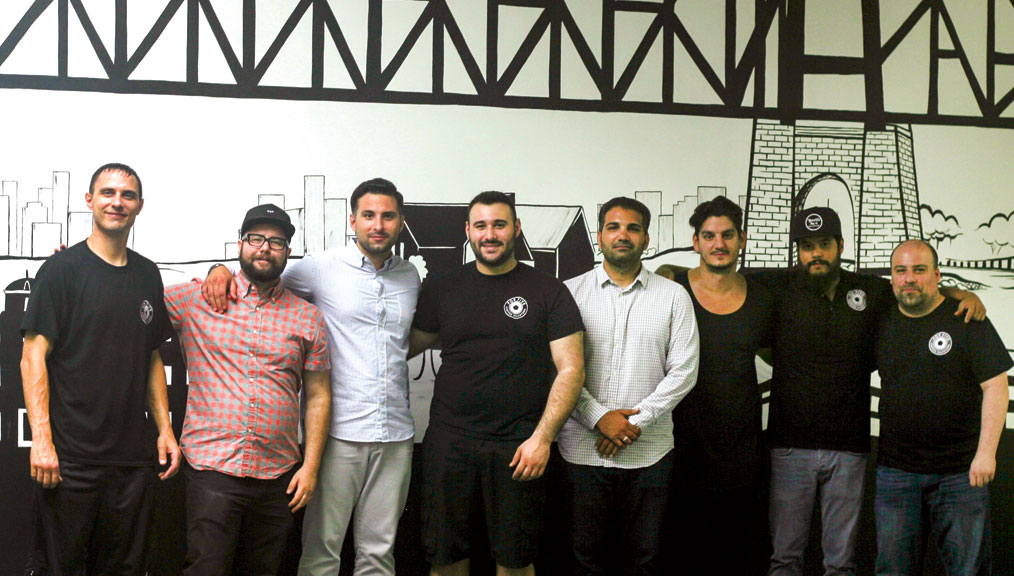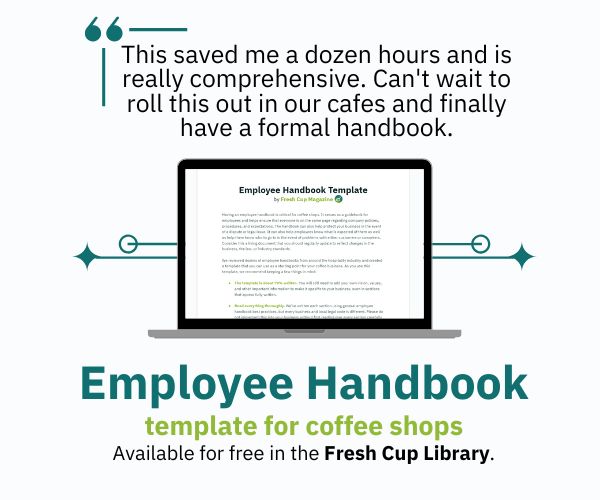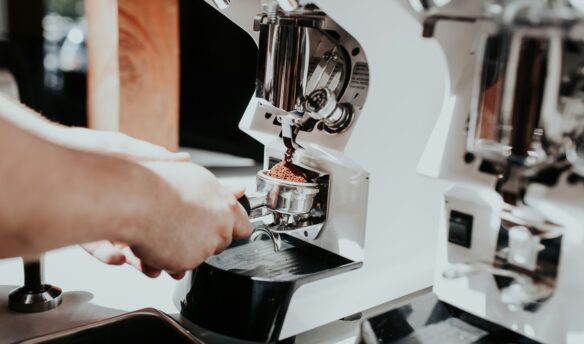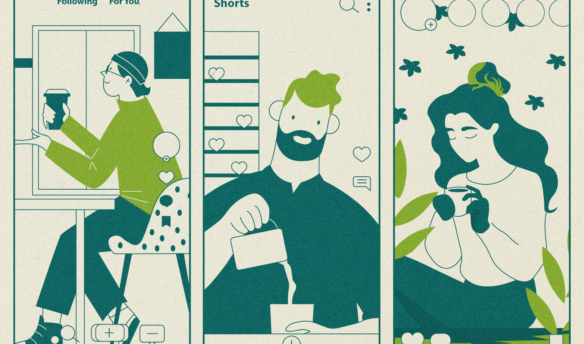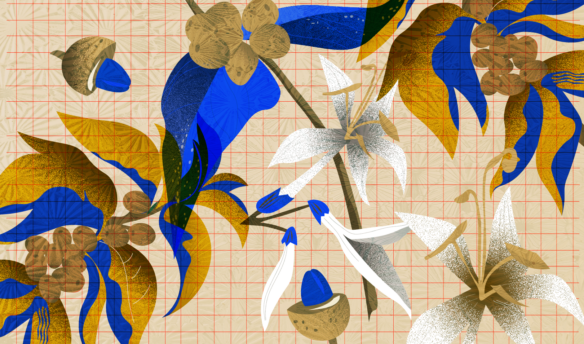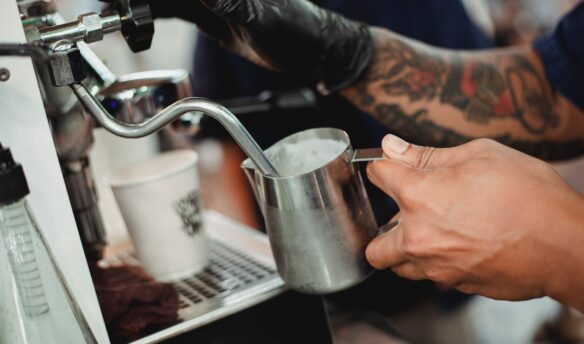[M]aking it in New York City is never easy. Operating a successful business here means navigating one of the most competitive markets in the country—competitive in terms of space, permits and licensing, and customer loyalty. It takes some seriously savvy hustle to translate success from another city to success in New York. Counter Culture’s wholesale program and training lab, Intelligentsia’s and Blue Stone Lane’s shops, and roasting operations by Stumptown, Blue Bottle, Toby’s Estate, and Devoción prove that what captivates coffee drinkers elsewhere can also win the hearts, palates, and dollars of New Yorkers. But it’s no guarantee.
Replicating success established elsewhere within the five boroughs is no small feat. Beginning a successful specialty coffee business from the ground up in New York presents a different kind of challenge. Oslo Coffee Roasters, Café Grumpy, Gorilla, Joe, Birch, Parlor, the Pulley Collective, City of Saints, and Variety Coffee Roasters have all forged the way during the past decade, and specialty coffee is becoming even more quality-obsessed with the emergence of micro-roasters like Supercrown, Luft, and Lofted. Many of these companies have informed each other, with professionals learning a craft at one company then launching a new business. Apart from this network, there is a segment of coffee roasting companies and cafés building unique businesses in neighborhoods and sectors that traditionally have not been part of New York’s specialty coffee culture. The Bronx, Harlem, and Queens have quietly built their own specialty coffee communities that reflect the cultures of the boroughs’ neighborhoods.
Haitem Weslati is the owner of Taszo Espresso Bar on 157th Street in the northern Manhattan neighborhood of Washington Heights. “In here, attitude is illegal,” he says. The café’s multilingual staff serves coffee beverages made with Colombian beans roasted at Devoción in Brooklyn, beer from local breweries, and Latin-inspired lunch fare. “I love it. I love the people, and I want everyone who’s here to love being here—staff and customers. If you have an ego then this isn’t the place for you,” says Weslati. The café is split, with communal counters and tables exclusively for laptop use in the rear and intimate New York-sized two-tops at the front for eating, reading, drawing, chatting, and savoring coffee.
“You see?” Weslati gestures to the shop’s patrons. “Teachers, students, artists, construction workers, business professionals, families—everyone is here and they are all welcome. I come from Sweden, and I wanted to create a shop that serves delicious coffee and food and feels as comfortable as an extension of your home.”
Manager Greg Ellson believes that vibe is achieved. “I was a customer for about a month before I said, ‘I need to work here. It just feels like home,’” he says. Taszo is designed to serve all the needs of the neighborhood, with trained baristas crafting gorgeous lattes, but also with a self-service drip-coffee station set out in the mornings to expedite the rush of commuters headed to the subway stop just steps from the café. There is signage explaining the origin and process of the beans on bar, but it’s small and by no means the focal point of the shop’s eclectic décor. Ellson says, “Everyone here is a regular. I can’t walk from my house to the 1 train now without seeing someone I know, which makes this entire neighborhood feel like a real community. We’re seeing the beginnings of gentrification around here, but this is an example of a business that enhances the neighborhood rather than puts a stamp on it.”
Taszo’s newest barista is Joseph Gonzalez. As a native Bronx resident, father of two, and passionate coffee professional who uses his days off to take SCAA courses and attend Counter Culture training classes and cuppings, Gonzalez exemplifies how specialty coffee’s radius in New York reaches far beyond the nucleus of north Brooklyn shops and roasteries that ignited the city’s specialty movement. “I was so inspired when Lem Butler won the US Barista Championships this year,” Gonzalez says. “Like me, he’s also a parent. It showed that anyone can make it all the way as a competitive barista. That’s my goal.”
He’s getting chances to practice as more and more coffee competitions are held in more places around the city. Uptown Roasters hosted the first Uptown Throwdown in April and a second in July, both at the Bronx Brewery. The participants and observers packing the brewery space in the Port Morris neighborhood of the South Bronx represented a true cross section of the city: multiple languages, cultures, backgrounds, and styles all meshed organically.
There is no such thing as a typical New Yorker, and the Uptown Throwdown showed that there is also no such thing as a typical New York coffee professional. The participants ranged in age from college students to retirees, and curious patrons at the brewery’s tasting room were converted into latte cheerleaders by the end of the night. All of this—the people, the location—cut against the lazy stereotypes of New York coffee culture. It also was a fulfillment of Uptown’s reason for existing.
There is no such thing as a typical New Yorker, and the Uptown Throwdown showed that there is also no such thing as a typical New York coffee professional.
“East Harlem and the Bronx are underserved in a lot of ways,” says Dan Hildebrandt, owner of Uptown Roasters. Uptown Roasters launched in the Bronx in 2014 with the goal of making specialty coffee more equitable by serving in neighborhoods where it has previously not been available. They also hired locals and set out to train a new generation of baristas. “I’m from Peru,” says Hildebrandt, “and my business partner Paul Cebul and I started a project called Reach Trade working with innovative Peruvian farmers. We approached fifty or sixty different roasters with the resulting coffee, but no one was interested because the quality wasn’t there. When we got to the point where we had good coffee, I decided we should be roasting and have our own cafés too, and we should serve the Latino community because not only is there that connection to origin, but everyone deserves access to high-quality products.”
Uptown started roasting in a storage space adjacent to the Bronx Brewery, and in July moved their San Franciscan roaster to East Harlem to be closer to their café on 110th Street. The new roasting location is inside the farm-to-table Italian restaurant Neapolitan Express, owned by lifelong Spanish Harlem resident and entrepreneur Max Crespo. Harlem food and beverage is redesigning itself from the inside out, doing just what Taszo manager Greg Ellson believes a smart business should: enhancing a neighborhood rather than branding it. “We have the United Nations of barista staff,” laughs Hildebrandt. “Our employees speak Spanish, English, and Chinese, and it totally works.”
Uptown Roasters contributes to East Harlem while still supporting the larger New York specialty coffee community by collaborating with other start-up roasting companies. Solidarity Roasters and Eastlick Coffee Company both rent time on Uptown’s equipment.
Joel Eastlick has a more traditional specialty coffee background and demonstrates how companies pioneering specialty coffee in new neighborhoods can seamlessly connect back to New York’s established coffee lineage. “Growing up, coffee was Folgers, but after living in Spain my aspiration was always to own a neighborhood café,” says Eastlick. In order to realize this goal, Eastlick knew he needed to develop his skills beyond the café positions of barista and roaster. Shared roasting space Pulley Collective opened shortly after Eastlick’s move to New York, and there he roasted with Ninth Street Espresso for two years. In November 2015 he launched Eastlick Coffee Company. New York houses plenty of corporate headquarters, but the city is powered by family businesses and fueled by people with unwavering dreams like these.
Building a coffee brand in New York is about more than coffee; it’s always about the neighborhood. Because the city’s eight million inhabitants are packed so closely together within the city’s three hundred square miles, politics, policies, feuds, loyalties, and other factors complicate how a new business fits into a given location. Starting a coffee operation in New York demands much more than knowing coffee—it requires knowing the city.
Across the East River in the Maspeth neighborhood in the borough of Queens, For Five Coffee Roasters is also revolutionizing New York specialty coffee, but through a different path than the community café. It’s working through wholesale distribution to the city’s most exclusive hotels, offices, and restaurants.
On a non-descript semi-industrial street just off Flushing Avenue, For Five’s roasting facility churned out a staggering 75,000 pounds of green coffee in June for its 1,100 wholesale accounts in the five boroughs and out of state. Headed by childhood friends Stefanos Vouvoudakis and Tom Tsiplakos, For Five Coffee Roasters is the smartest, sexiest coffee company you have never heard of.
“You see the mural in the loading area? That’s the Queensboro Bridge,” explains Vouvoudakis. “The vision of connecting the whole city is ingrained in our name and logo. For Five Coffee—coffee for the five boroughs. The logo is in the shape of the old subway tokens to show that just like the subway can take you all over the world by visiting the city’s different cultures, coffee can transport you across the globe in a cup.”
New York’s no-nonsense delis and diners are immortalized in countless TV shows and movies, and those lifeblood establishments are how For Five built their company. “We started with mom-and-pop shops to build our customer base,” says Tsiplakos. “You don’t want to start a company with four major customers and then lose one and it rocks the infrastructure. The base was built on small hospitality businesses, which were our forte from our previous experiences—Stefanos’s in coffee distribution and mine in industrial linen.” Tsiplakos and Vouvoudakis respect their strengths and sought out experts in other fields, most notably hiring Billy Brogan as director of coffee.
Vouvoudakis says, “I remember sitting with Tom, looking at roasting companies UPSing coffee into New York from other cities. I asked him, ‘Why not us? Why not build this thing in New York, in Queens, where we’re from—for New Yorkers by New Yorkers?’ A year and three months later we’re about to open our first retail location on 46th Street in Times Square.” The location of For Five’s first café is symbolically located in the heart of the city, at the convergence of the subway lines that inspired the brand.
The tagline on the iconic blue Anhora coffee cups—“it’s our pleasure to serve you”—remains true. New Yorkers are in the hustle together, and it is the honor of New York-born companies to serve other New Yorkers.
Shops like Taszo and roasters like Uptown involve their neighborhoods in all that they do, from the people they hire to the events they host to the ways they lay out their shops. Wholesale companies like For Five are the arteries that connect these neighborhoods to each other, reminding that everyone—no matter where they live or work—equally appreciates a good cup of coffee.
Vouvoudakis is looking to the future. “This is a new-age coffee roasting facility, but still with that timeless New York work ethic. You open up that gate every morning, and you just smile. It’s fun. It’s exciting. There’s this buzz here that you just don’t get anywhere else.”
—Rachel Northrop is a sales rep with Ally Coffee‘s specialty importing division and author of When Coffee Speaks: Stories from and of Latin American Coffeepeople.

